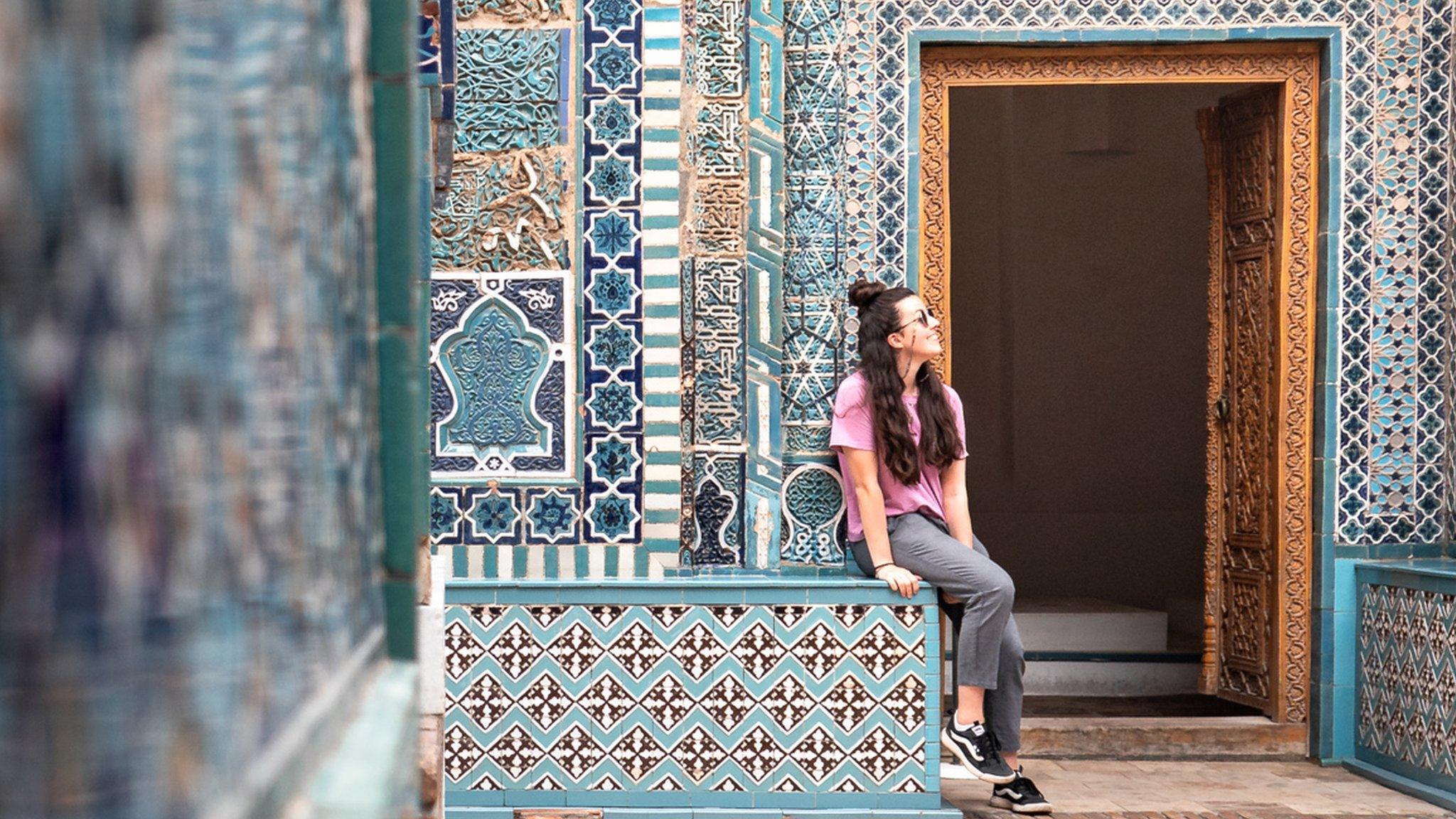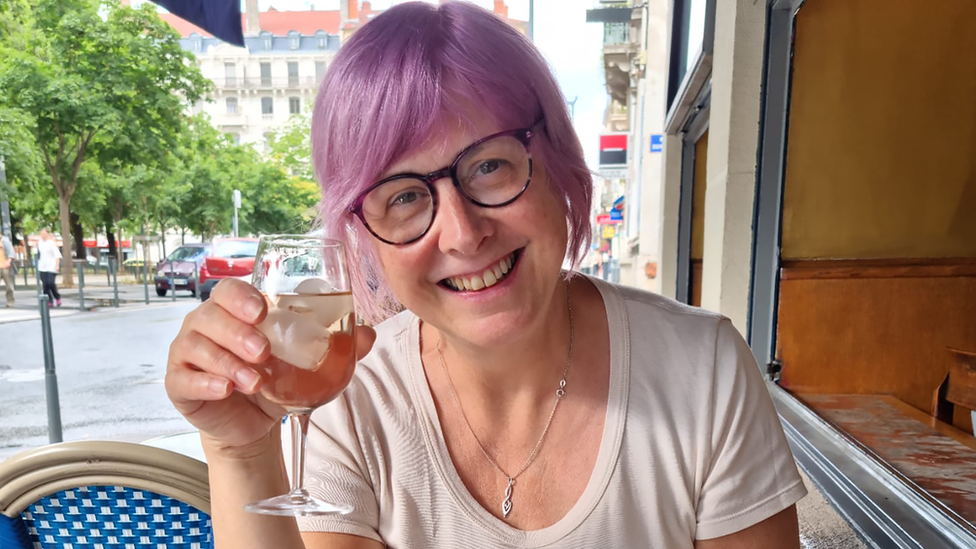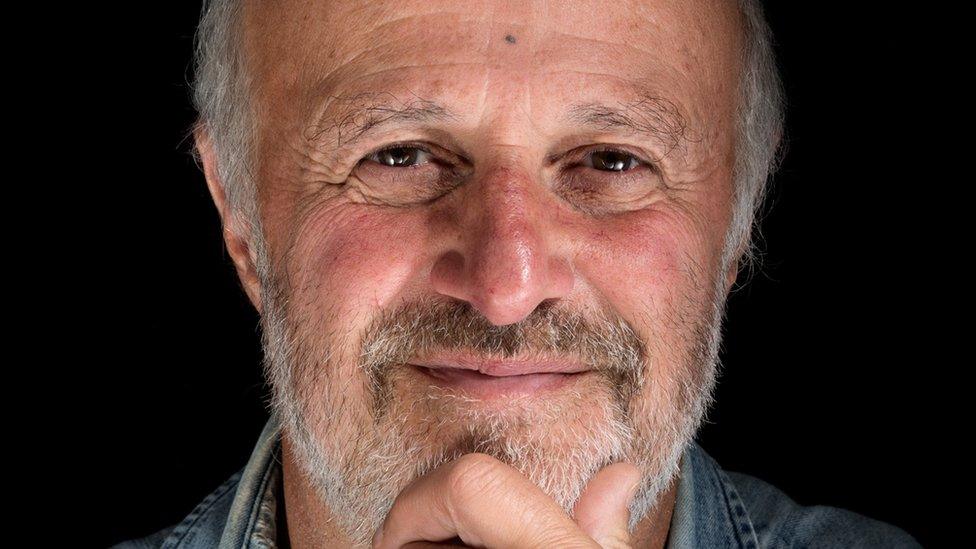'I have worked from home in 78 different countries'
- Published

Katie quit her nine to five office job to travel the world
For Katie Macleod, working from home has meant logging on to her laptop from pod hotels in Tokyo, amid sandstorms in the Sahara and even taking Zoom calls while in the Himalayas.
The 28-year-old has been to 78 countries while still managing to keep working as a freelance graphic designer.
"I'm hoping to visit 100 countries before I'm 30," she says.
Katie is one of a growing number of digital nomads who have swapped a permanent office for a series of locations around the world.
She has been documenting her travels on her blog, external and, since beginning back in 2018, has seen her chosen lifestyle grow in popularity.
"I'd personally pin that down to the pandemic, nowadays there are more remote jobs than ever in the world," she says.

One of Katie's favourite memories she has made since becoming a digital nomad is floating in a hot air balloon in Turkey
A study in the US found the number of American workers acting as digital nomads had more than doubled since the start of the pandemic and is continuing to grow., external
Dave Cassar, the global head of international for MBO Partners, the company that commissioned the report, believes a similar trend is happening in Europe.
"We haven't been able to locate a single study done in Europe on this topic exclusively, but we have been pulling in the data and it's very similar to the US," he tells BBC Scotland.
"In fact, per capita in Britain, the data suggests that a greater percentage of people are actually taking on this lifestyle of nomadism."

Katie says that the lifestyle isn't always as glamorous as Instagram makes it look but for her the pros outweigh the cons
Katie grew up in Inverness and studied graphic design in Edinburgh. Following a successful internship, she began working for a London-based advertising agency.
But she says she found it monotonous, dull and uninspiring.
"The schedule of a typical day at work was always pre-determined, I had very little time to work on my personal goals and dreams," she says.
"Had I known in school and university that this lifestyle existed, I would have been more certain in making the necessary choices to realise the dream sooner," says the 28-year-old graphic designer.
"Luckily I chose a career that is very suitable for digital nomadism."
The Covid pandemic made international travel more difficult but Katie adapted by converting a van and travelling around the UK.
As soon as she could, Katie returned to moving around the world preferring to stay in places that have "co-living spaces" tailored specifically to working professionals. Otherwise she stays in Airbnbs or hotels which she says are becoming better at providing the facilities for travellers to work remotely.
Katie acknowledges that being constantly on the move can be a struggle.
"I've slept on more airport floors than I can count," she says.
"I've struggled to find any internet to work, been conned into spending more money because I'm a foreigner, and had a lot more food poisoning than your average Joe."

Catriona enjoying a glass of wine while working on her laptop in Paris
According to new research by social business Flexibility Works, almost a quarter of desk-based workers in Scotland say their employer has granted them complete freedom to work where they like.
Catriona Cripps is one of the people who has adopted the digital nomad lifestyle following the pandemic.
She had been working as a business coach in Stirling for the past 20 years and was forced to work from home when lockdown happened.
Having long wanted to live in Spain, she saw remote working as an opportunity to achieve that goal.
So, in June, she sold her house and began travelling across Europe, working online in hotels and cafes.
"I just thought if I don't do it now when am I going to do it?," she says.
"I'm in my sixties, I have fewer responsibilities, I no longer have elderly parents and my children are all grown up," she says.
Catriona has been enjoying the experience, so far visiting seven different countries, although she admits that the constant travel can be "quite disruptive".
"It's great to say I've done 15 cities and seven countries, but that was a lot of travel which eats into your day quite a bit," she says.
"I now recognise that what I need to do is settle in places a wee bit longer rather than being on the move every two or three days."
The other big challenge for her has been finding places with stable enough Wi-fi to allow her to get on with her work.
"Although hotels and Airbnbs say they have Wi-fi it can be a bit hit or miss which is not ideal when you're working online."

J David Simons wrote his novel 'The Responsibility of Love' while traveling across the world as a digital nomad
Another digital nomad, J David Simons, believes that the biggest logistical problem for people living this lifestyle is not having an address.
"It is so important in terms of banking, tax, visas, rental agreements and those sorts of things that you can show you have a permanent address," he says.
"Even when you haven't."
David is a writer and journalist from Glasgow who sold his home in 2017 and had been travelling across the world when the pandemic happened.
He says: "I had a great trip planned for Mexico and Cuba, great apartments rented in Mexico City and Havana to work in, all of which had to be cancelled.
"That took me off the road mostly for the last couple of years when I have been flitting mainly between Scotland and Spain. But, of course, with Brexit kicking in, I'm only able to spend 90 out of each 180 days in Europe now."
The 68-year old is currently planning a trip to Spain in the winter to work on his next novel.
"I've always been something of a nomad," he says.
"When the digital communication revolution came about - robust broadband, free Wi-Fi internet, I could see the opportunity to travel and work remotely.
"So I started calling myself a digital nomad, even wrote a short story about it."
David believes that the rising costs of living in Scotland and the UK may inspire other remote workers to give digital nomadism a try.
"It's not a question of how much wealth you have, it's more a question of whether you have work that you can do remotely," he says.
"Work that pays enough to fund your lifestyle which in many places is far cheaper than in the UK.
"You also need an adventurous spirit I guess and to be willing to embrace constant change without the benefit of the anchor that people call home."